Social Point of View:
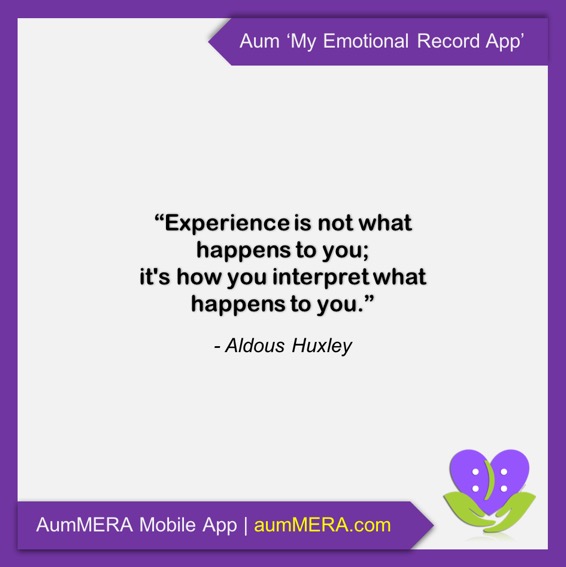
“All learning is emotional.”- Greek philosopher Plato. In brief, learning all about emotions is must for social-sucess for sure; and emotions know-how could be learned just by noting them down along with concerned person, place, events and experience in AumMERA - My Emotional Record App.
As all of us have seen, in the social context, that it has a significant effect on how people express and communicate their emotions. Emotion also has a significant effect on one’s relations with others.
You must have heard about ‘Emotional Intelligence, which could be defined as “the ability to monitor one’s own and others’ feelings and emotions, to discriminate among them, and to use this information to guide one’s thinking and actions" - Salovey and Mayer (1990).
Psychological Point of View:

Listen to your feelings with an open heart, record all your fellings and emotions in AumMERA - My Emotional Record App - and you have already made great strides in recovering from mood swings and /or depression (if any).
For many of us, learning how to understand and handle our feelings is a lifelong task.
Some people are afraid of emotions because they fear they will be overwhelmed, even consumed by them. But rather than saving you from emotional pain, repressing your emotions can make it more likely you will become depressed.
The danger of tuning out your feelings, is that if you lose your ability to feel painful feelings, you can also lose your ability to feel joy and vitality. The result: an emotional greyness or numbness can take over your life.
Most of the time you treat your feelings gently but are rigid and judgmental with your own. You might be heading towards the minute kind of depression, unknowingly. To need to take care by changing the old patterns. When trying to change old patterns, treat yourself with sensitivity. It is important to be compassionate toward your feelings. Ask yourself, “Why am I so sad?” Be compassionate, interested, curious to learn more. It is far better than being angry or disgusted with yourself. Go in with the intent to learn rather than judge.
To further help yourself recovering from depression (if any) getting in touch with your feelings is an especially powerful tool. Since depressed people are usually more aware of their shifting moods than the feelings that caused the moods. One minute you are feeling fine, then suddenly you are feeling hurt, or anxious, or angry, without knowing why. Mood changes like these may be caused by an unfelt feeling, which can be traced to an external event.
Life-style Point of View:
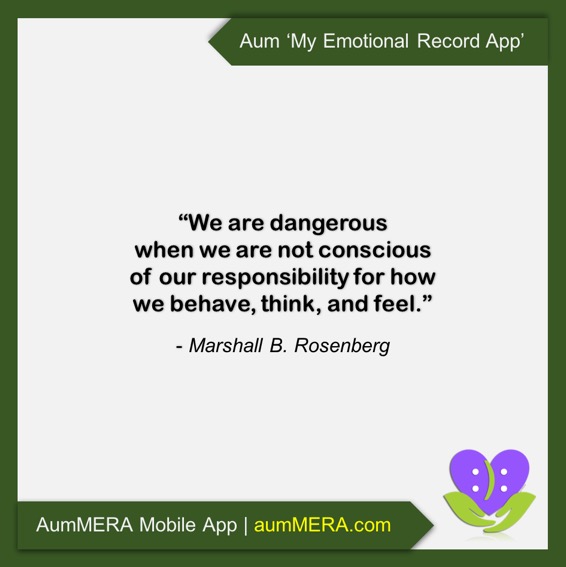
AumMERA - My Emotional Record App - is the tool to provide you an add on memory chip to your mind, which is easy & handy to operate compare to bodily organs and it proves to be the best support in bringing organization into your life.
According to WebMD, memory is the “ability to normally recall the facts and events of our lives.” While most people associate memory simply with the process of recollecting information, it actually includes three stages. The first stage of memory, according to WebMD, is encoding, which involves taking information in. The second stage is consolidation, wherein the brain processes the information you’ve taken in and stores it in a certain part of the brain. The third and final stage is retrieval, which takes place when you recall the information stored in your brain. Stress, anxiety, depression, ADHD, and metabolic diseases can often disrupt this process of memory creation, storage, and retrieval.
Anything and everything that your five sense organs perceive is naturally recorded in your mind. you have no choice about it. Every sound, every smell, every taste, every sensation, every sight that you have perceived is there in your mind. The question is just your ability to recall it when you want it. For example, you meet someone you know well, yet when he is in front of you, you don’t recollect his name — such an awkward situation. Later on, at another moment, his name comes to your mind when it is of no use. Yes? Have you seen these things happening to you? When you need it, it does not come. When you don’t need it, it comes. That means your mind definitely has the substance, but it is just disorganized. It is disorganized simply because you are handling everything in a chaotic way.
When we say chaotic, the most chaotic way to live is to be anxious. Don’t be anxious to be focused. Learn to relax into life. If you develop a love for what you are doing, you will see that you will naturally grasp everything that you need to grasp. Rather than trying to concentrate on your study or work, if you see the usefulness of what you are doing, if you enjoy what you are doing, you will see that grasping things will come naturally to you. Everybody has the capability. When you try to concentrate forcefully, you will miss the most obvious things. When you are in anxiety, you have your car keys in your hand, yet you search for them all over the house. Has it happened to you?
The moment you create anxiety, there is chaos in the mind. If you go to a library with a million books piled up in one heap, can you find what you want? But if everything is catalogued and kept in the organized way that it should be kept, you can probably go blindfolded and find the book that you want. This organization is needed for your mind. Chaos has come to your mind only because of anxiety. You are anxious and you cannot help it because right now, your happiness is dependent upon what will happen in your life today. If you are happy, if you are a joyous person, there is no anxiety for you because you know that no matter what happens today, you are still going to be the same within yourself. Then, it is only your concern for the external which makes you do work. You are not trying to make your life through that.
So if anxiety has to go, first of all you need to learn how to be a peaceful and joyful human being by your own nature and not because of something outside of you. When you are like this, your mind is a beautiful instrument; it is a great friend of yours. Keeping the above wise words in mind will help you improve your concentration and memory and bring organization into your life.
Human-Resoures (Emotional & Spiritual Intelligence) Point of View:
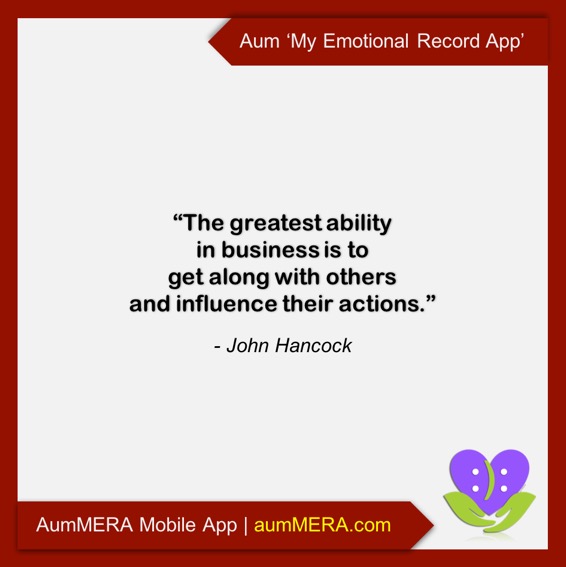
AumMERA - My Emotional Record App – fits to be a better tool here for the training of employees, managers esp. the Human Resources Department of the organisations on their personal capacity as well.
Due to globalization, workplaces have a diversity of employees. As with diversity, collaboration, co-operation and teamwork have become increasingly important issues for management to handle. The nature of work is constantly changing. Traditional concept of lifetime employment has also changed. Employees of the future need to demonstrate to the organizations that they can add value to the organization.
Organizational soul and workforce spirit have often been overlooked and ignored by many. But, now Organizations have started to show an interest in spiritual values. Work life reaches and touches into the very soul and spirit of all employees at work. Those at work are constantly seeking ways to improve themselves and a sense of contribution to their work life.
Workplace unity creates a stronger organization, one that can withstand the uncertainties in this dynamic business environment. This form of spirit requires not only the spiritual intelligence but also emotional intelligence. Emotional Intelligence has garnered attention from psychologist, educators, leadership theorists and business leaders.
Work has become the main feature of many people. It has also become the main issue in the society. On the average, an individual who is working in the office works about 10 hours. The workplace has become a place where individuals or the employees find their sense of full meaning.
The spirit at work becomes the guiding principles of wholeness, relationships, inner wisdom and inner authority. Individuals are anxious to know their meaning of life. They would like to relate their spiritual selves with their professional lives.
As argued by Wright (2008), employees will display behaviours based on their different characteristics. Their characteristics depend largely upon their level of cognitive and non-cognitive abilities. Cognitive abilities refer to their level of education, skill and experience. Non-cognitive abilities refer to the levels of
“Emotional Intelligence” and “Spiritual Intelligence”. Both these abilities complement each other. Their complementariness will result in a better workforce for the organization. They will display better levels of teamwork, co-operation and inter-active skills. A united workforce will strengthen the organization and their cohesiveness will increase the level of productivity in the organization. Customers will be happy. They will want to patronize the organization more often. Sales will increase. Profits and market growth rise as well. Organization would benefit from both the Emotional and Spiritual Intelligences.
Hypnotic Point of View:
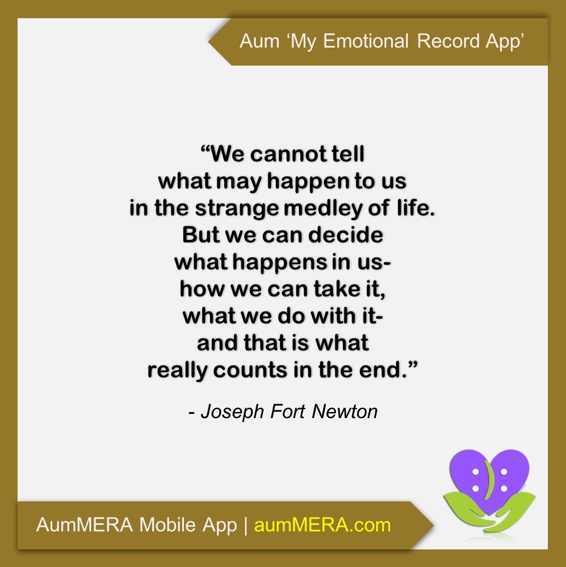
Regression, the therapeutic remedial act through hypnosis, very similar to that of making entry to AumMERA - My Emotional Record App - can be used to help recall events from the other night or from any point of your lifetime. It can help you remember specific details of an event or even better, to observe it objectively and to understand its meaning and significance. It certainly can be a very powerful psychological tool to dive into the deeper parts of the mind.
You cannot heal what you cannot feel”: this tool can also be used when aiming to increase self-compassion. In order to develop self-compassion, it is important to pay attention to the experiences that are present, in order to take appropriate compassionate action. For instance, if you experience shame, the kind inner voice that can be cultivated can be focused on the experience of this specific emotion (“It is ok to experience shame; I am a human being and I make mistakes. This experience of shame tells me that I can learn from this experience so that I can do it differently next time").
The mind is uniquely prepared to experience the continuity of time. While we are advised to live in the here and now, we all wander into the past or future. The 'memory and imagination' vary from person to person.
Even if you can remember every detail from your life, nobody can recall how these events affected them. The mind automatically filters out certain experiences out of normal memory. So, what kind of stuff becomes unavailable to our own thinking? Actually, there is a lot of information that never gets stored in our memory banks in the first place but, even more importantly, there are plenty of experiences that cannot be recalled because they are repressed - kept out of our awareness some how. These are the memories worth analyzing because they sit there deep inside the mind affecting our lives nonetheless.
Everybody has memories buried in the unconscious. Most of these memories are not that scary or horrible but some can be very uncomfortable to face. Many of the more dramatic things that happened to you as a child are resting in your unconscious, even if you can remember these events, some of their effects remain unobservable to the average person.
A good question is ‘why is it difficult to recall some memories and not others?' It is the function of the unconscious mind in great detail. Feud’s philosophical idea is that the mind is made up of different levels of awareness and activity. The research into the formation and use of language demonstrates “unconscious” levels at which words, thoughts, and sentences are created.
The real problem is that we all experience a variety of events that were unpleasant, painful, embarrassing, or just difficult to cope with, which sometimes push these memories out of the conscious mind down into that hidden reservoir of the mind - the unconscious. These can be traumatic experiences, or just awkward ones that we do not want to remember or cannot recall because they were repressed out of awareness.
This deeper unconscious sphere of mental activity can be compared to an iceberg, the large bulk of which is out-of-sight beneath the ocean surface. Similarly, your mind has many activities that operate outside your awareness for good reasons. The brain evolved to economize our focus of attention to limit the amount of what is in our awareness. Consequently, there can be a large amount of mental stuff that you are not aware of but may still have an important function.
Hypnosis is one of the best ways to help people access those “buried” memories.Everyone has memories or experiences in their unconscious mind that they may not be able to recall but still play a significant role in everyday life. Through Hypnotic Regression you enter a trance and recall material from deep inside that is normally not available to the conscious mind. Hypnosis enables the mind to travel more easily across the dimension of time.
Regression in hypnosis is the process by which you are guided back through time to particular events that need to be examined. It is actually relatively simple; you are to travel back through the years to recall specific memories.
Yogic Point of View:
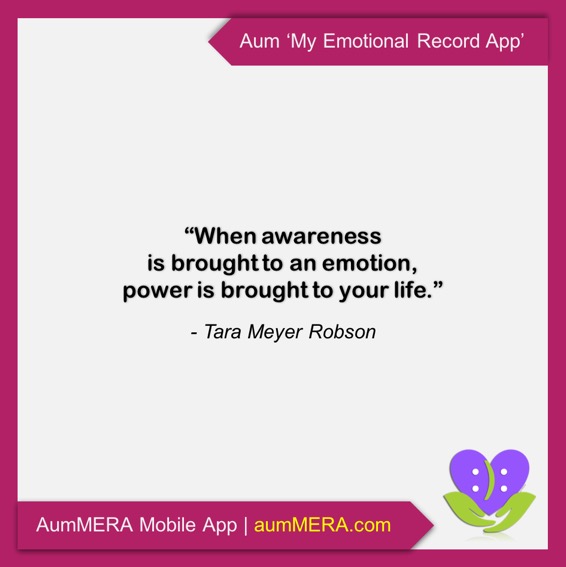
AumMERA - My Emotional Record App - could be much useful to record the emotions accurately and then classify them into 'raga' or 'dvesha' therafter on the basis of their impact on your mind. Hence, the above mentioned spiritual goal becomes much easier to be achieved through Yoga if, AumMERA is used on daily basis.
Up and down ... up and down. Isn’t this how we feel most of the time? We fluctuate between feeling good and bad, happy and sad. We like this and dislike that. We try to attract joy and we attempt to avoid suffering. We act and react, over and over again ...
These opposite states of experience are described in yoga philosophy as obstacles along our path to freedom. When we feel up we usually want to stay there, so we develop attachment (raga) - the pull toward anything we like or want. When we feel down, we want to get away so we develop aversion (dvesa) — the pushing away from something. We experience dvesa when we encounter a relationship or sensation that does not feel good.
The danger of tuning out your feelings, is that if you lose your ability to feel painful feelings, you can also lose your ability to feel joy and vitality. The result: an emotional greyness or numbness can take over your life.
Two sides of the same coin — one causes longing if not achieved, and the other causes pain if not avoided. This up and down is a pattern of suffering that we pass through all day, every day, to greater or lesser degrees. And although natural, these emotional swings are inhibitors to our ability to sustain inner peace and lasting happiness.
Raga and dvesa are among the five kleshas or blocks that Patanjali’s Yoga Sutras identifies as states of being that contribute to our spiritual ignorance (avidya). Until we can bring these emotional fluctuations under conscious control, we are at the mercy of our preconditioned patterns.
Just take a moment to consider since waking this morning, how many times you moved toward something you liked, or away from something or someone you didn’t like. It’s easy to see how — consciously or subconsciously — these polarities drive many of our decisions and behaviors. Until we come to a state of balance, where the seesaw of raga-dvesa stops tipping from one extreme to the other, we will not experience harmony in our bodies, minds or emotions.
According to the Yoga Sutras, the purpose of yoga is to still the fluctuations of the mind to perceive our true nature. We will never be able to dwell within our changeless essence if we are always tossed around by that which changes, otherwise known as the ego self.
Here are six Yogic practices to help balance your emotions and leave you more even-keeled:
- Notice the impulse to move toward or away from various things, and choose to remain neutral instead.
- Practice being content with whatever is happening, rather than seeking to have your personal agenda filled.
- Remember to be compassionately present in circumstances that might be undesirable or uncomfortable.
- Choose to be a witness rather than indulge that which wants to be heard.
- Practice non-reactivity when conflict arises and seek a balanced, peaceful resolution.
- Attempt to be neutral rather than opinionated in most circumstances.
Even-mindedness is both the practice and the goal of yoga, despite the daily inner battle we may continue to experience. We can trust that every time we take a step in this direction, we get a little bit closer to freedom.
Mystic Point of View:
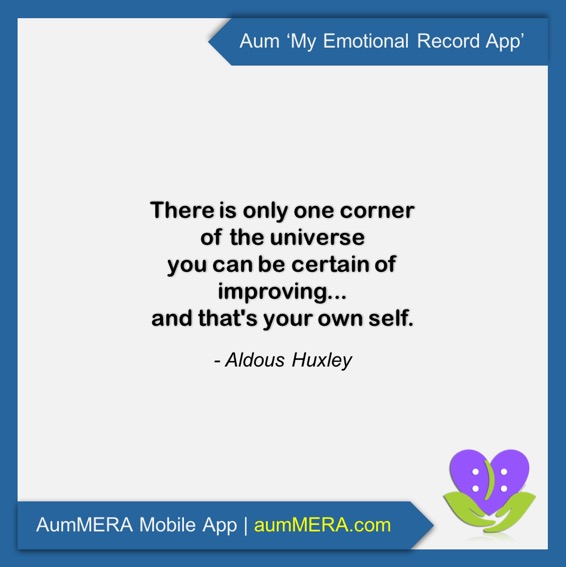
Similar to the above mentioned festivals & occassions, and like that of the rituals therein, AumMERA - My Emotional Record App - is capable enough to help in washing-off the runanubandha once the related emotions are noted down, steadied and sheded-off at will.
Body is storage of memories.
The body has its own memory. Today, there is research going on in this direction. To put it in a simplified way—let us say your father, when he was a child, liked to play with round objects, and he developed a certain level of involvement with them. As his child, without knowing why, you will tend to choose similar things. It is proven that these repetitions happen. This is simply because you carry a certain genetic material.
There is also something called runanubandha, which is a certain kind of physical memory that you carry within you. Runanubandha cannot be equated with the genetic factors that are being transmitted from parent to child. It is a physical memory of where you came from—not necessarily in terms of colour of your skin, shape of your nose, how you are built, and so on.
It is just that the body remembers any kind of intimacy—not only with another physical body, but with any physical substance. Even if you as much as hold someone’s hand, you develop runanubandha. That is why in India, people greet you with folded hands. They do not want to acquire runanubandha. The same applies for passing on certain substances such as salt, sesame seeds, or soil—people never take them from somebody else’s hands, to avoid developing runanubandha. You pick up runanubandha in many ways, but sexual relationships have maximum impact in terms of the amount of memory that they leave behind.
When physical memory overlaps, it causes a physical level of confusion, which will bring a certain level of discomfort, lack of exuberance and involvement with anything around you. You become a veteran of life.
This can be fixed in so many ways. There are many processes to wash off the runanubandha. There are certain festivals such as pongal or bhogi that are about clearing up your mental and emotional baggage, and your runanubandha. You can also take to some chanting to create a certain reverberation in the body. At certain temples such as Linga Bhairavi, there is a ritual “fire wash”. This is a way of burning physical memories that you have picked up.
During certain seasons, such as the shift of the Sun from the southern to northern hemisphere, and again, from north to south, the winds are strong on the Indian subcontinent. One simple process is to go and stand in the wind so that you get a proper air wash. Try this—when there is a strong breeze, wear something loose and stand there for half-an-hour, with your eyes closed. Turn both ways, so that the breeze flows over you from the front and back. You will feel so much lighter and better.

Imagine that you are negotiating a deal with someone who appears to be feeling angry or in contrast this with a similar negotiation in which the other appears to be feeling happy. To whom would you think be better to close the deal with? Your choice could be any but, research describes that an angry opponent is dissatisfied with how the negotiation is going and unlikely to settle for what’s on the table; and that a happy opponent is basically content with the current offer and therefore likely to accept it. It is proved through many researches that the monitoring of one’s own and others’ feelings and emotions can guide one’s thinking and actions.
More so, the emotions and social relations are intimately intertwined. On the one hand, the ways in which people express emotion are shaped by their social appraisals and their social motives. On the other hand, the emotions that people express carry information that enables others to make strategic adjustments to their social behaviour. So while emotions are regulated by social relations, they in turn help to regulate these relations.